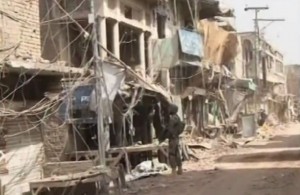Sharif Sees Power Eroding in Pakistan
Okay, time for me to eat a bit of crow. Back in the middle of August, I claimed “Pakistan Revolution Fizzling Out” and said that the dual protests led by Imran Khan and Tahirul Qadri were turning out to be much smaller than anticipated and that they would quickly fade away. Two weeks later, those protests continue and are showing signs of eroding the power of Pakistan’s Prime Minister Nawaz Sharif.
The protests had remained largely peaceful until this weekend when the protesters tried to remove barriers of shipping containers so that they could storm the Prime Minister’s house. Security forces around the residence reacted strongly and now most sources agree that at least three people have died and hundreds have been injured. Meetings are taking place along multiple fronts, with Sharif having met with the head of the military, various representatives of the protests meeting with the government and the Supreme Court offering to become involved (it has already ruled against the protests). The situation is quite fluid today and Sharif has called for a joint session of Parliament for tomorrow.
Despite all this, Sharif for now remains adamant that he will not step down:
According to sources, the embattled Prime Minister Nawaz Sharif informed army chief General Raheel Sharif that he will not resign in the wake of protests by Pakistan Awami Tehreek (PAT) and Tehreek-e-Insaf (PTI).
Insiders said that in the meeting that lasted over two hours, the prime minister and army chief discussed the ongoing political crisis in detail – and its likely fallout.
Sources said that General Sharif presented a range of options before Nawaz, including stepping down for a month to allow for investigations over last year’s elections to conclude.
However, a senior Pakistan Muslim League-Nawaz leader insisted that the prime minister will not step down, and will in fact address a joint session of Parliament on Tuesday.
When the government’s television station was overrun by the protesters, the military stepped in to retake the building:
Pakistani troops took control of security at the headquarters of the state-run television network on Monday after hundreds of demonstrators stormed the building and forced the network to temporarily halt broadcasting.
Antigovernment demonstrators armed with sticks and batons ransacked the Pakistan Television building in central Islamabad on Monday morning, smashed vehicles in the parking lots and cut transmission cables in the newsrooms. PTV officials said that at least 20 cameras were missing.
To illustrate just how fluid the situation has become, consider this bit of reporting from Dawn [Javed Hashmi is the President of Imran Khan’s PTI party but appears to be in the middle of a falling out with him]:
Hashmi said he was ashamed and said he was sure Imran was too.
“Now I’m going to say something and maybe Imran will refute that as well but it would be good if he didn’t.”
“Imran had told the core committee it won’t be called a martial law…we will file a petition in the Supreme Court and get a judge of our choosing…and he will say okay…we didn’t talk about Bangladesh…that CJ will validate the actions that will be taken eventually…today I have heard that CJ has called all judges…Justice Jilani will retire and the current CJ will become chief justice…and they will get rid [of the government]”.
“When Imran laid out the plan, I said to Imran, Khan sahab what are you doing? What are you getting involved in? You have our support. You have the support of so many people…Khan said we are going ahead…he said I am telling you there will be elections in September and everything has been worked out.”
According to Reuters, some believe that the crisis is reaching a decisive moment:
Defense Minister Khawaja Asif told Reuters the government was preparing to launch a selective crackdown against protesters, possibly later on Monday, and warned demonstrators against storming government buildings.
“The writ of the state must be enforced. We hope to make a decisive move sometimes later today, not in the evening but even before that,” he said. “I personally feel that the next few hours will determine the course of coming events.”
Reuters doesn’t believe, however, that the military intends to seize control completely:
How the crisis ends will be ultimately decided by the army. If the protests get out of hand, the military could step in decisively, imposing a curfew or even martial law.
There is also a question mark over how much protest leaders are capable of controlling their own people, many of them frustrated after weeks of hardship and no solution in sight.
Alternatively, the army could side with the protesters and put pressure on Sharif to resign, in which case an interim government would have be put in place and early parliamentary elections held to elect a new government.
However, few observers believe the army is bent on seizing power again. A weakened Sharif would allow the army to remain firmly in charge of key issues such as relations with India and Afghanistan while allowing the civilian government to deal with day-to-day economic problems in which it has little interest.
It goes almost without stating that the situation in Pakistan should be watched very carefully over the next few days.


